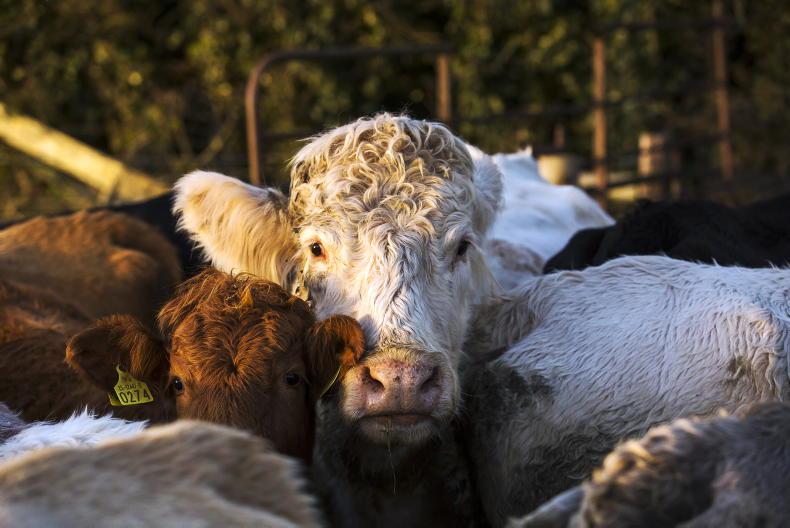There is a risk that farmers will face “excessive amounts of bureaucracy and burdensome red tape” when it comes to accessing anti-parasitic products for their stock, the Irish Cattle and Sheep Farmers Association (ICSA) has warned.
ICSA animal health chair Hugh Farrell highlighted the need for competition in the anti-parasitic market and called on the Department of Agriculture to ensure it does not bring in rules which are “anti-competitive”.
Farrell was speaking on the veterinary medicinal products medicated feed and fertilisers regulation bill 2022, which proposes that farmers will have to first obtain a prescription from their vet before being able to buy animal dosing products in their co-op or through a licensed merchant.
“Competition is critical when it comes to ensuring that farmers have access to anthelmintic doses, which play an important role in animal health and thrive.
"We are very concerned that an unduly onerous and over-restrictive prescription-only regime will be introduced and we are fighting to ensure that we find workable solutions that keep product available at a fair price to farmers,” he said.
‘Variety of outlets’
The ICSA animal health chair pointed to the importance of competition in the market for supply of anti-parasitic products.
“[The] ICSA believes that there is a real risk to competition in relation to anti-parasitic products, which up to now have been sold by veterinary practitioners, licensed merchants including co-op shops and pharmacies.
“The variety of outlets selling such products has been critical to ensuring that products are available at a fair price to farmers without excessive mark-up for the retailer or for the pharmaceutical company,” he said.
Generic options
Focusing on the availability of generic dosing products, Farrell said that they “usually offer far better value than the original patented products” and that, therefore, “competition between outlets not only offers price benefits, but also ensures that there are more pharmaceutical manufacturers competing to sell generic options”.

The viability of low-income cattle farms could be threatened by veterinary medicine proposals. \ Philip Doyle
The Cavan suckler farmer confirmed that the ICSA supports the position of the Licensed Merchants Association in seeking to ensure that practical solutions are found to deliver full competition.
“[The] ICSA emphasises that a failure to ensure full competition in relation to anti-parasitics will further threaten the viability of farmers, particularly in the low-income cattle and sheep sectors, and could potentially lead to under-use of products.
“This, in turn, would be contrary to the need for greater efficiencies in animal performance. Lower animal performance is contrary to the objective of finishing cattle and sheep at an earlier stage, which is now a policy objective in terms of climate targets,” he said.
Read more
Significant percentage of liver fluke treatments almost worthless
Department considers legal opinion on vet medicines
There is a risk that farmers will face “excessive amounts of bureaucracy and burdensome red tape” when it comes to accessing anti-parasitic products for their stock, the Irish Cattle and Sheep Farmers Association (ICSA) has warned.
ICSA animal health chair Hugh Farrell highlighted the need for competition in the anti-parasitic market and called on the Department of Agriculture to ensure it does not bring in rules which are “anti-competitive”.
Farrell was speaking on the veterinary medicinal products medicated feed and fertilisers regulation bill 2022, which proposes that farmers will have to first obtain a prescription from their vet before being able to buy animal dosing products in their co-op or through a licensed merchant.
“Competition is critical when it comes to ensuring that farmers have access to anthelmintic doses, which play an important role in animal health and thrive.
"We are very concerned that an unduly onerous and over-restrictive prescription-only regime will be introduced and we are fighting to ensure that we find workable solutions that keep product available at a fair price to farmers,” he said.
‘Variety of outlets’
The ICSA animal health chair pointed to the importance of competition in the market for supply of anti-parasitic products.
“[The] ICSA believes that there is a real risk to competition in relation to anti-parasitic products, which up to now have been sold by veterinary practitioners, licensed merchants including co-op shops and pharmacies.
“The variety of outlets selling such products has been critical to ensuring that products are available at a fair price to farmers without excessive mark-up for the retailer or for the pharmaceutical company,” he said.
Generic options
Focusing on the availability of generic dosing products, Farrell said that they “usually offer far better value than the original patented products” and that, therefore, “competition between outlets not only offers price benefits, but also ensures that there are more pharmaceutical manufacturers competing to sell generic options”.

The viability of low-income cattle farms could be threatened by veterinary medicine proposals. \ Philip Doyle
The Cavan suckler farmer confirmed that the ICSA supports the position of the Licensed Merchants Association in seeking to ensure that practical solutions are found to deliver full competition.
“[The] ICSA emphasises that a failure to ensure full competition in relation to anti-parasitics will further threaten the viability of farmers, particularly in the low-income cattle and sheep sectors, and could potentially lead to under-use of products.
“This, in turn, would be contrary to the need for greater efficiencies in animal performance. Lower animal performance is contrary to the objective of finishing cattle and sheep at an earlier stage, which is now a policy objective in terms of climate targets,” he said.
Read more
Significant percentage of liver fluke treatments almost worthless
Department considers legal opinion on vet medicines







 This is a subscriber-only article
This is a subscriber-only article










SHARING OPTIONS: